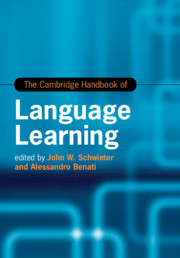Book contents
- The Cambridge Handbook of Language Learning
- Cambridge Handbooks in Language and Linguistics
- The Cambridge Handbook of Language Learning
- Copyright page
- Contents
- Figures
- Tables
- Contributors
- Acknowledgements
- Introduction
- Part I Theories
- Part II Methods
- 5 Qualitative Classroom Methods
- 6 Experimental Studies in L2 Classrooms
- 7 Action Research: Developments, Characteristics, and Future Directions
- 8 Classroom Observation Research
- 9 Psycholinguistic and Neurolinguistic Methods
- Part III Skill Development
- Part IV Individual Differences
- Part V Pedagogical Interventions and Approaches
- Part VI Context and Environment
- Part VII Moving Forward
- Index
- References
6 - Experimental Studies in L2 Classrooms
from Part II - Methods
Published online by Cambridge University Press: 25 June 2019
- The Cambridge Handbook of Language Learning
- Cambridge Handbooks in Language and Linguistics
- The Cambridge Handbook of Language Learning
- Copyright page
- Contents
- Figures
- Tables
- Contributors
- Acknowledgements
- Introduction
- Part I Theories
- Part II Methods
- 5 Qualitative Classroom Methods
- 6 Experimental Studies in L2 Classrooms
- 7 Action Research: Developments, Characteristics, and Future Directions
- 8 Classroom Observation Research
- 9 Psycholinguistic and Neurolinguistic Methods
- Part III Skill Development
- Part IV Individual Differences
- Part V Pedagogical Interventions and Approaches
- Part VI Context and Environment
- Part VII Moving Forward
- Index
- References
Summary
In the past, experimental research was somewhat at odds with qualitative research, both in terms of ontology (one’s view of reality) and epistemology (what knowledge is). Experimental research falls within a postpositivist paradigm, which suggests that an objective and discoverable truth exists (its ontology) and that we can find out that truth by generating and testing hypotheses (its epistemology). Using the example of authentic listening materials, this means that under ideal circumstances, researchers should be able to determine the effect of authentic listening materials on listening comprehension. Qualitative research, on the other hand, falls within a postmodernist paradigm that rests on the ideas that there are multiple truths (its ontology) and that research should try to uncover the diversity of experiences and perspectives on a topic of inquiry (its epistemology).
- Type
- Chapter
- Information
- The Cambridge Handbook of Language Learning , pp. 137 - 165Publisher: Cambridge University PressPrint publication year: 2019
References
- 5
- Cited by

